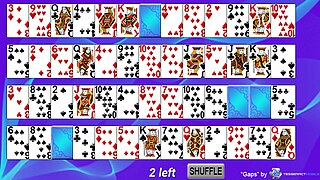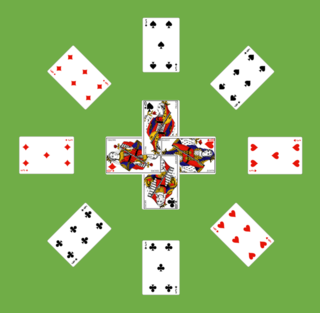Related Research Articles

Klondike, also known as Canfield, is a card game for one player and the best known and most popular version of the patience or solitaire family, as well as one of the most challenging in widespread play. It has spawned numerous variants including Batsford, Easthaven, King Albert, Thumb and Pouch, Somerset or Usk and Whitehead, as well as the American variants of the games, Agnes and Westcliff. The distinguishing feature of all variants is a triangular layout of the tableau, building in ascending sequence and packing in descending order.
Perpetual Motion is a Patience game which has the objective of discarding playing cards from the tableau. The name relates to the time-consuming process of the game. It is also called Idiot's Delight or Narcotic.
Gargantua is a patience or solitaire card game that is a version of Klondike using two decks. It is also known as Double Klondike.

Gaps is a member of the Montana group of Patience games, where the goal is to arrange all the cards in suit from Deuce to King.

Napoleon at St Helena is a 2-deck patience or solitaire card game for one player. It is quite difficult to win, and luck-of-the-draw is a significant factor. The Emperor Napoleon often played patience during his final exile to the island of St Helena, and this is said to be the version he probably played. Along with its variants, it is one of the most popular two-deck patiences or solitaires. The winning chances have been estimated as 1 in 10 games, with success typically dependent on the player's ability to clear one or more columns. The game is the progenitor of a large family of similar games, mostly with variations designed to make it easier to get out.
Aces Up is a quick and simple, one-pack, patience or solitaire card game.

Quadrille is the name of two loosely related card games of the Patience or solitaire type which are often confused. Both use a pack of 52 playing cards. The earlier one was also known as La Française or Royal Quadrille, the slightly later one as Captive Queens. The name is derived from the desired outcome of the earlier game in which the four Kings and Queens are arranged in a square formation as in the European dance of quadrille that was fashionable in the 18th and 19th centuries.
Hit or Miss is a patience or card solitaire that uses a deck of 52 playing cards. It is an unusual one in that the player deals the cards one at a time. The game is significantly based on luck-of-the-draw, but the process of elimination gives it appeal nonetheless.
British Square is a patience or solitaire card game which uses two decks of 52 playing cards each. It is a fan-type game in the style of La Belle Lucie. It has an unusual feature of switchback building whereby each foundation is first built up and then built down.
Eagle Wing is a Patience game which is played with a deck of 52 playing cards. The game takes its name from the tableau which depicts an eagle-like bird spreading its wings in flight. It is somewhat related to the Canfield variant Storehouse.
Heads and Tails is a solitaire card game which uses two decks of playing cards. It is mostly based on luck.

Colorado is a solitaire card game which is played using two decks of playing cards. It is a game of card building which belongs to the same family as games like Sir Tommy, Strategy, and Calculation. It is considered an easy game with 80% odds of being completed successfully.
Penguin is a patience or solitaire card game, invented by David Parlett, which uses a deck of 52 playing cards. The game play is similar to solitaire card games like the popular Freecell and its predecessor Eight Off.
Napoleon's Square is a patience or solitaire card game which uses two decks of playing cards. First described in a revised edition of Lady Cadogan's Illustrated Games of Patience or Solitaire in the early 1900s, it is an easy variation of Napoleon at St Helena. It is not determined if Napoleon actually played this game, or any solitaire game named after him.
Odd and Even is a solitaire card game which is played with two decks of playing cards. It is so called because the building is done in twos, resulting in odd and even numbers.
Intrigue is a solitaire card game which is played using two decks of playing cards. It is similar to another solitaire game called Salic Law, but it also involves the queens and building in the foundations goes both ways.
Leoni's Own is a 19th century American card solitaire played with two decks of playing cards shuffled together. This game may have come from Austria, takes approximately 20 minutes and is described as medium regarding difficulty and also uses an ingenious method called weaving. It is often confused by card game book writers with Weaver's which has a similar mode of play but different rules and terminology.

Fortune's Favor or Fortune's Favour is a patience or card solitaire which is played with a deck of 52 playing cards. It is so-called probably because the chances of winning are completely on the player's side. It is a significantly simplified version of the game Busy Aces, a member of the Forty Thieves family of solitaire games.
Moojub is a card solitaire which is played using one deck of playing cards. It was invented by Geoffrey Mott-Smith and Albert H. Morehead around 1950.
Corona is a relatively long and difficult patience or card solitaire using two decks. The object of the game is to move all of the cards to the foundations. Successfully winning the game is considered difficult.
References
- ↑ Vos Savant, Marilyn (21 August 1994). "Ask Marilyn: A hat check problem", Parade Magazine. Retrieved 23 October 2020.
- ↑ Doyle, Peter G.; Grinstead, Charles M.; Laurie Snell, J. (2 April 2009). "Frustration Solitaire", arXiv:math/0703900 . Retrieved 23 October 2020,
- ↑ The Complete Book of Card Games (1993), p. 73.
